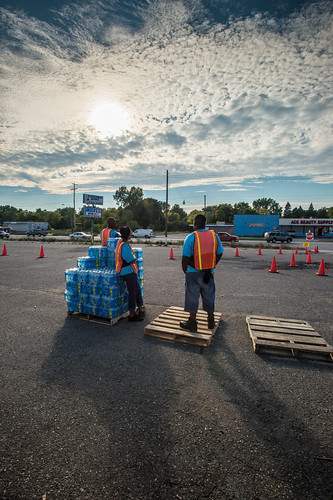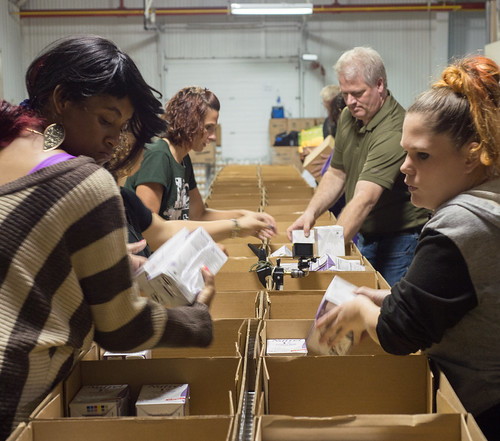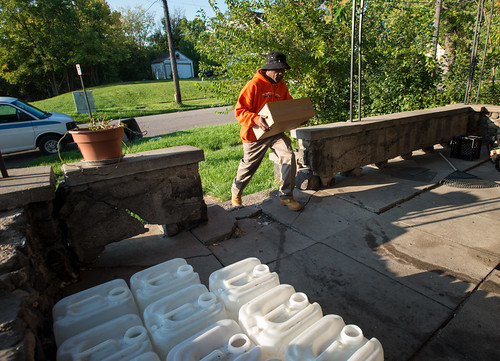
USDA’s emergency food program in Flint, Mich., offers a unique response to the city’s lead crisis. To support the health of the area’s low-income residents, USDA’s Food and Nutrition Service promotes key nutrients and adequate diets.
“This community is an old manufacturing town. A lot of the factory jobs have left the area, and unfortunately the people are left behind,” explains Matthew Purcell, Executive Director of Genesee County Community Action Resource Department (GCCARD), a local community action organization that assists low income residents. After dangerous levels of lead were discovered in the city’s water pipes, everyday life in Flint became even more challenging. When a local resident like Reggie needs to take his medications, he can’t fill a cup of water from the kitchen sink. He makes regular trips to water pickup stations in churches and abandoned parking lots to ensure an adequate supply of safe drinking water in his home. When Mrs. Smith draws a bath for her four grandchildren, she is afraid to use the water from the pipes. She drags large jugs from the front porch through the house and pours them, one by one, into the tub.
FNS is using nutrition to help Flint residents recover from the public health crisis. With the assistance of state and local partners, FNS provides packages that contain foods rich in vitamin C, iron and calcium – which may mitigate the absorption of lead. Fruit juices, whole-grain cereals, beans and low-fat milk provided by the USDA are packed into supplemental food boxes at GCCARD’s warehouse in eastern Flint.

Tom Priest and his coworkers from the State of Michigan’s Food Distribution Department are such avid supporters of the program, they use their personal vacation time to volunteer with GCCARD. “The USDA gave us additional food to help deal with lead mitigation for the citizens of Flint, so we’re here helping get those packages packed and ready for distribution,” explains Priest. GCCARD distributes these supplemental boxes to 17,000 households across Flint alongside USDA’s ongoing The Emergency Food Assistance Program (TEFAP). If recipients struggle to make it to a distribution center, the boxes are delivered directly to their homes.
The boxes offer more than just healthy foods. “We’re helping to address some of the psychological, as well as financial burden, that they may be facing,” Purcell points out. Recipients are grateful to have their load lightened. “To be honest, we’d be struggling if we didn’t have the assistance,” says Reggie Brass. His elderly mother appreciates the contents of the box, as well as the connection she has with James Norman, the GCCARD worker who brings the 14 pound packages into the house. “Most seniors don’t have a lot of people that come visit them… When I see them, they’ll give me a hug, and it makes their day,” explains Norman, who delivers packages to nearly 400 residents. “We’ve got some wonderful people here in the city of Flint,” adds Brass.

In addition to the nutrient-targeted food packages, FNS offers extensive nutrition education through the Supplemental Nutrition Assistance Program Education, commonly known as SNAP-Ed. The program teaches ways nutrition may be used to mitigate lead absorption. FNS also provided more than $220,000 to help area schools purchase additional fresh fruits and vegetables. The emergency food packages will be available through the end of 2016, when residents will be encouraged to utilize ongoing FNS nutrition assistance programs to meet iron, calcium and vitamin C targets.
For more information about USDA's support for those affected by the Flint lead crisis, please visit our Flint Fact Sheet.


